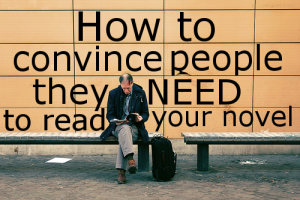Did you take the leap with me last week and admit to yourself that your writing is what needs improving–not your friends’ tastes? Are you ready to find out how to fix it?
Meet AIDA.
No, AIDA isn’t the personal writing coach I’ve hired to help you turn your novel into a bestseller, but if you want to think of it that way, go ahead.
AIDA is an acronym for Attention > Interest > Desire > Action: a basic formula marketers and salespeople use to guide them through each phase of the sales process. It goes like this:
Attention: Get noticed. In a media-saturated world, this is hard to do.
Interest: Once you have their attention, prove you have something worth their time–by giving them the most compelling part of your message in as brief a form as possible.
Desire: Once you have their interest, show them how the product will meet a need they have.
Action: Once they know they want it, tell them how to get it.
How does it apply to your novel?
Attention:
Getting a friend’s attention could be as simple as letting them know you’re writing a book (“Really? What’s it about?”). For a literary agent you’re querying, it’s spelling their name right and following all the submission guidelines. But for your toughest audience—the book store customer who’s never heard of you—it’s a lot tougher. You need a cover and a title that stand out among hundreds of others. We’ll talk more about this in the coming weeks.
Interest:
What makes this worth the time of the friend, literary agent, or customer? This one’s a bit trickier, but it follows the question your friend asked you when you got their attention: what’s it about? You have to summarize your story in the most compelling way possible, in a few sentences. This is known as your elevator pitch or “hook”—it’s how you’ll describe your book to people at cocktail parties, how you’ll begin your query letter, and what you’ll give to the writer or intern who’ll craft the copy for your book cover. This is the part that makes your friend ask to read it, the agent to request a full or partial manuscript, and the customer to flip to page one. I’ve actually already covered the hook extensively:
- How to write a hook
- Hook examples
- It also helps to have a killer first sentence.
Action:
I’m gonna do a flip-flop on you and talk about Action first, because before we can understand the Desire phase, we have to understand what action we want our audience to take. For a friend it might just be to finish reading the book. For an agent it’s to offer representation. For the book-store customer, it’s to buy the book. It seems like three very different stages, but really it all boils down to the same thing: you want them to keep reading. You have to suck them in fast. You have to make them want to know what happens next. Which brings us to:
Desire:
How do you convince a reader this piece of fiction is something they need? Ask yourself—why do you read? Is it an escape from reality? An alleviation of boredom? A hunt for truth? A search for someone who understands you?
It’s sure to be one of those reasons. It may be all of them.
Those are the needs. And it takes the whole book to meet those needs. But the promise—and the evidence—that you can meet those needs happen in the first few pages. That bookstore customer is not going to keep reading to see if it gets better—you must grab them in the first paragraph. And to keep all your readers reading, you have to keep sucking them in deeper and deeper throughout the entire book.
A variety of factors affect this “sucking in.” But there are two main things you absolutely can’t succeed without:
- A relatable protagonist.
- Conflict.
If your reader relates to, or identifies with, your hero, you’ve begun forging an emotional connection. When you add conflict—which usually involves threatening the thing that hero loves most—you create the reader’s need to find out: “What happens next? Does the hero overcome the conflict?” And, since the reader relates to this hero, the subconscious question: “Could I overcome that conflict?”
–
Discover the Whole AIDA Series:
Attention
- 5 tips for grabbing attention with your book cover
- 6 types of book titles that get noticed – and picked up
Interest
Desire
- 20 tips for creating relatable – and lovable – protagonists
- The 21 best tips for writing your opening scene
Action
–

How to get people to read your book.






